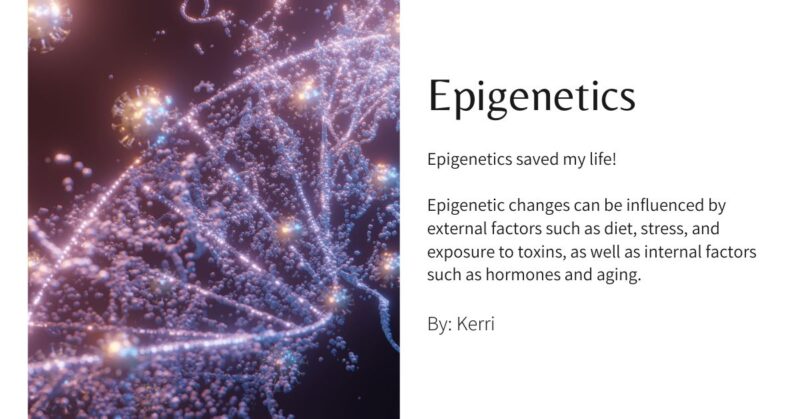Epigenetics saved my life!
I have a rare blood cancer called essential thrombocythemia jak 2, there is no cure, but you can live a long and normal life for the most part as long as you maintain your stress levels. Hence why I know so much about stress, and well-being. My life depends on it, and a matter of fact so does yours. Let me explain to you a little deeper about what Epigenetics is and how it works.
Epigenetics is a fascinating field of biology that focuses on the study of heritable changes in gene expression that are not caused by changes in DNA sequence. Simply put, epigenetics is the study of how genes are turned on or off, and how these changes can be passed down from one generation to the next.
To understand epigenetics, it’s important to first understand how genes work. Genes are segments of DNA that carry instructions for the development and function of our bodies. Every cell in our body contains the same set of genes, but not all of them are active at the same time. The way genes are turned on or off is determined by a variety of factors, including environmental factors, lifestyle factors, and genetics.
Epigenetic changes can be influenced by external factors such as diet, stress, and exposure to toxins, as well as internal factors such as hormones and aging. These changes can have profound effects on gene expression and can lead to the development of diseases such as cancer, diabetes, and heart disease.
One of the most well-known examples of epigenetic changes is the phenomenon of genomic imprinting. Genomic imprinting is a process by which certain genes are turned on or off depending on whether they are inherited from the mother or the father. For example, in mammals, the gene for insulin-like growth factor 2 (IGF2) is normally only expressed from the paternal allele, while the maternal allele is silenced. This is because the paternal allele has a special epigenetic mark called DNA methylation that prevents it from being silenced.
Another example of epigenetic changes is histone modification. Histones are proteins that help package and organize DNA in the cell nucleus. Modifications to histones, such as the addition or removal of chemical groups, can affect the accessibility of DNA and therefore its expression. For example, acetylation of histones is often associated with gene activation, while methylation is often associated with gene repression.
Finally, epigenetics also plays a role in aging. As we age, the epigenetic marks on our DNA change, leading to alterations in gene expression that can contribute to the aging process. For example, studies have shown that changes in DNA methylation patterns can predict age-related diseases such as Alzheimer’s disease.
Epigenetics is a fascinating field of biology that is shedding light on the complex interplay between our environment, our genetics, and our health. By understanding how epigenetic changes occur, we may be able to develop new treatments and preventive measures for a wide range of diseases.
🔥 Take the Next Step! If you’re fascinated by Epigenetics and want to explore intention setting, don’t miss my post “Intention Alchemy (Epigenetics & Intention Setting).” Or, dive into a curated collection of reads on Self-awareness to enhance your understanding. Expand your knowledge today! 🔍📚 Check it out now!
And hey, don’t forget to download your FREE eWorkbook on Self-awareness. Click the link here to claim your copy and embark on a transformative journey of self-discovery. 📖✨


